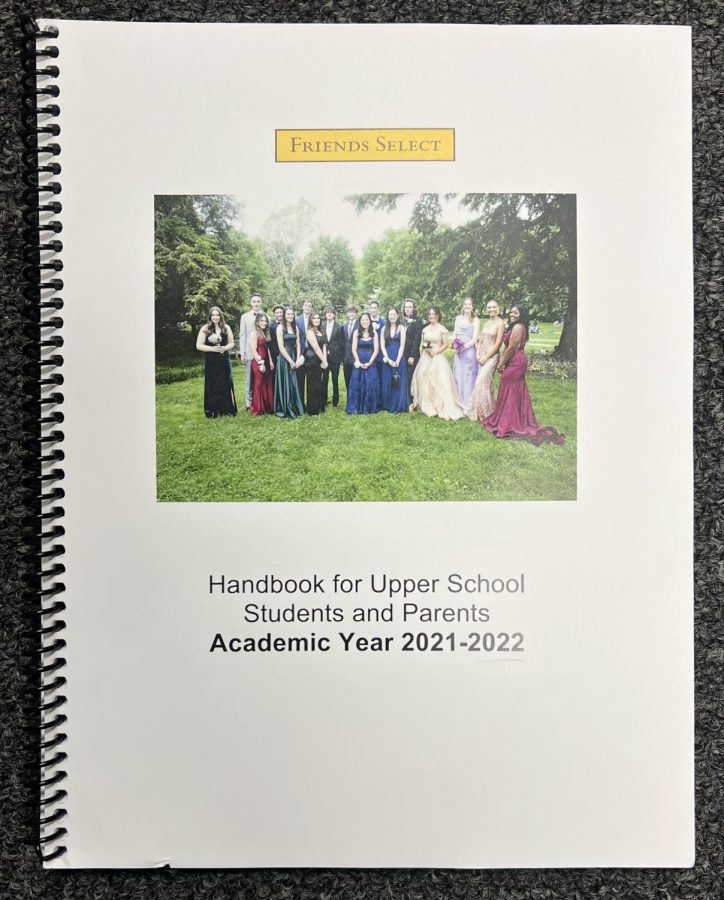The Student Handbook: The Terms and Conditions You Might Want to Read
The Friends Select student handbook. That 80-page booklet you were given at the beginning of the year that you probably threw in your bag and never thought about again. That 80-page booklet that you signed a paper saying you read. That 80-page booklet that’s filled with rules upon rules, every single one you’re meant to follow, and every single one you agreed to follow, whether you decided to actually read them or not. So what’s in that booklet? Is it even worth the read? I think it is. Or rather, I know it is.
First off, I would like to state that there’s nothing inherently wrong with neglecting to read the student handbook, I’ve been guilty of it for a few years. And the faculty is aware that students probably don’t read it as well. Norman Bayard, Upper School Dean of Students, said that he didn’t think every student or every parent read the handbook, which is a statement that I agree with. But I also think that’s a problem. Because to be a Friends Select student, it is required to sign a paper stating that you’ve read and agreed to all the terms inside of it. There’s nothing seriously wrong with agreeing without reading. I can’t say that I read the long list of terms and conditions every time that I update my iPhone, or buy a new one. But school handbooks are different. They’re things that you have to abide by every day. Yes, every day. Even when you’re not in school. According to page 54 of the Student Handbook in the off-campus behaviors section: “The policies and standards apply at all times a student is enrolled in the school, including when a student is on campus or in the immediate vicinity of campus; anytime a student is participating in or attending a school-sponsored event on or off-campus; any time a student is officially representing the school; any time a student is traveling on behalf of the school; and in the evenings, on weekends, and doing school breaks, including summer break.”
That’s right. Every single rule in the handbook is applicable at all times. No matter where you are. Or, when you are. So let’s get into what those rules are, shall we? Rule number 10 of the major school infractions, as in the ones that can get you suspended, or expelled, is against lying. Yeah, just lying. Or, to put it into more exact terms, “Repeated or egregious acts of dishonesty.” Keep in mind, academic dishonesty is its own category, so this just means, plain old, lying. But that’s not all. The inspection policy states that “Inspections and searches may be conducted on a routine or random basis or as deemed necessary” and “Students must provide any passwords or other access required to inspect such places or cameras and any other electronics, including the contents of same (texts, emails, photos, images, address books, etc.) Whether such message or information was sent over the school’s systems or any personal accounts.”
This is a big enough problem on its own, but that’s without mentioning the outdated policies that the handbook contains. It’s updated when a new rule is needed or when it is called to attention that one needs to be updated such as the dress code in 2019. But, it’s not reviewed every year. While this is understandable, it does lead to some problems. For instance, on page 52 in the drugs and alcohol section, it is stated that spices and incense are not allowed. Factoring in the rules in the off-campus behavior list would mean that they couldn’t even be used at home. When I brought this up to Norman he too was initially confused and admitted that it could be outdated or related to things such as the cinnamon challenge, or using nutmeg for the wrong reasons.
Not to state the obvious but these things are problems. To have a rulebook filled with invasive and outdated rules that most people don’t even know they agreed to is just terrible. But, I would like to be clear and state that I am not placing the blame on anyone. To be personally in charge of making sure the handbook is perfect would be stressful, and there’s no world where everyone can be happy. But that doesn’t mean that we shouldn’t and can’t make change. During my interview with Norman, he brought up that at his old school they would go through the handbook with freshmen and maybe even act out certain situations to help students get a better understanding. He was also open to students contributing to edits and having more of a say in the contents.
So please, read the Student handbook when you get a chance, or, at least skim it. If you lost your copy, it’s available elsewhere, like on the school website. And if you see something that needs to be changed or added, speak up about it. This is our school, and we have the ability to have a say in what’s going on.























